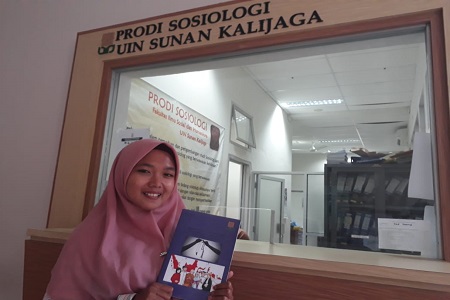Marriage with Different Religions, Are You Sure?

Indonesia as a diverse nation (both in religious and cultural settings), interfaith marriage is part of the social dynamic that cannot be avoided. Interfaith marriage becomes ritual diversity that keeps repeating in our society. Debates and even conflicts are inevitable both that arise from within the family and the public. On the other hand, interfaith marriage in sociology has offered dynamic experiences that educate people for the maturity of the state.
Why do interfaith marriage families still live in harmony? This question intrigued Alifah Maharani, a student of Sociology 2015, to research interfaith married couples in Sendangrejo, Karanganom, Klaten. The research work in an undergraduate thesis was entitled ‘Negosiasi Nilai-Nilai Religius dalam Keluarga Beda Agama’ which was successfully defended inmunaqasahon August 14, 2019, with the supervisor Dr. Yayan Suryana, M.Ag.
"(This research) comes from my curiosity about how interfaith couples can live harmoniously. Reflecting on myself, I often think that our religion is the truest. However, why is this not visible in the interfaith couples? How can they mediate it in their family? Such questions make me take up the topic,” Alifah said.
Despite the marriage contract has to choose one of religion (following statutory regulations), it is not easy to maintain the promise of one religion's marriage. They are disposed to return to formerly religion which happened to all informants in this study. Alifah studied five informants from interfaith families. The five of them (both wife and husband) eventually returned to their first religion but they remained in a household. The factors for their return include a conscience, discomfort in the new religion, and social pressure.
Alifah's research describes the strategy of how to make interfaith marriages keep continuing. A lot of problems in the family has to face. The willingness and readiness attitude to accept the consequences must be embedded from the beginning. Because the tendency to return to the former faith is great, the best step is respecting choices for the sake of household integrity.
Meanwhile, Alifah presents a finding daily practice in people who married different creeds. To maintain household integrity, they help each other in terms of (preparation) of their couple. As such at Christmas, a Muslim husband helps his Christian wife in preparing for Christmas. On the other hand, the same way happened during Eid's momentum. Also, tolerance in the family, dialogue, and negotiation must be put forward to reach a mutual agreement in interfaith families.
Using the Peter L. Berger approach, Alifah tries to explain the process of negotiation and vigorous dynamics in the interfaith family — as the construction of social reality — through the process of externalization, which is the effort to express the human self into the world both physically and mentally; objectivation, which is the achieved result in the context of objective reality; and internalization, which is the re-absorption of the objective world into consciousness. These three systems could analyze the negotiation of religious values in interfaith families (@bjeben).
#SociologicalUpdates
